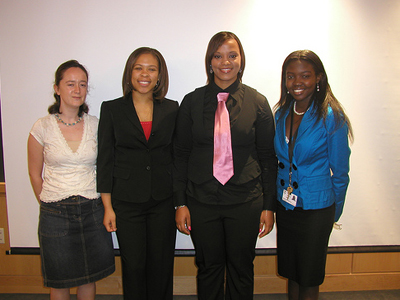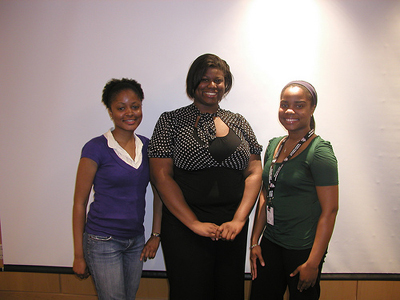Faculty Mentor: Dr.Eric Tchetgen
Graduate Student Mentor: Miguel Marino, PhD candidate
Program Participants: Dana
Bryant , Rebbecca
Wilson, and Willythssa
Pierre-Louis
Project Title: Evaluating gene-environment interaction between oral contraceptive use and BRCA1/BRCA2 mutation on the risk of ovarian cancer
Project Description: Use of oral contraceptives is known to reduce the risk of ovarian cancer. However, there is a need to further understand its effect on this risk in women with or without a BRCA1 or BRCA2 genetic mutation, an important genetic determinant of ovarian cancer. Students conducted an analysis to study the interaction between BRCA1/2 mutations and use of oral contraceptive on the risk of ovarian cancer. Students also used multivariate logistic regression methods for case-control data to evaluate the interaction between us of oral contraceptive and genetic mutations BRCA1/2 among approx. 1600 women in a case-control study conducted in Israel. The goal is to demonstrate that oral contraceptive use is less protective against ovarian cancer in women who carry the BRCA1/2 genetic mutation, when compared to non-carriers.

Caroline Jeffrey (Graduate Student Mentor), Dana Bryant, Rebbecca Wilson, Willythssa Pierre-Louis
Faculty Mentor: Dr.Tianxi Cai
Graduate Student Mentor: Alisa Stephens
Program Participants: Kevelynn Hare, and Yolanda Kennedy
Project Title: Assessing Associations Using Electronic Medical Data

Alisa Stephens (Grad Student Mentor), Yolanda Kennedy, and Kevelynn Hare
Faculty Mentor: Dr.
Christoph Lange
Graduate Student Mentor: Peter Lipman
Program Participants: Gerald Morgan and Brittney Stewart
Project Title: Genetic Determinants of Alcoholism
Project Description: This project used regression models to investigate genetic determinants of alcoholism. They applied multivariate regression models to the Collaborative Study on the Genetics of Alcoholism (COGA), which contains genetic and phenotype information on approximately 1600 subjects from 143 families. The goal of the project was to identify any significant genetic markers of alcoholism (or surrogate phenotypic traits).

Gerald Morgan, Brittney Stewart, and Peter Lipman (Grad Student Mentor)